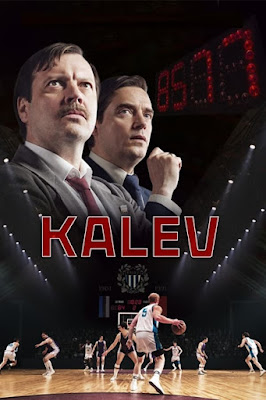Everyone loved the Lithuanian Men’s Basketball Team, the so-called “Other Dream Team,” who made an Olympic run shortly after the Baltic nation declared its independence from the Soviet Union. However, there were mixed feelings about the Estonian Kalev team’s pursuit of the final championship of Soviet Republics, especially in Estonia. Initially, there were calls to boycott, but those gave way to cheers of “beat Russia.” Of course, the Soviet sports system still tries its best to rig the tournament against Estonia in Ove Musting’s Kalev, Estonia's official International Oscar Submission, which screens during the AFI’s European Union Film Showcase.
Initially, Aivar Kuusmaa has decidedly mixed feelings on the independence movement, because the Soviets rewarded athletes like him for their international victories. Nevertheless, everyone suspects this year could very well be the final Soviet championship. Frankly, public opinion is already against Estonian participation, even before Gorbachev ordered Soviet tanks to invade neighboring Lithuania.
Despite public sentiment, their coach, Jaak Salumets, remained committed to the Soviet Championship. He even recruited a prominent Russian player and George Jackson, the first (and only) American to play in the Soviet League. During his tenure with Kalev, Jackson faced racism from fans and opposing teams, which Musting and co-screenwriters Martin Algus and Mehis Pihla gloss over. However, they fully expose the corruption and favoritism within the Soviet sports authorities. Honestly, the referees and sideline judges might has well have suited up in Russian jerseys.
Musting focuses much of his attention on Kuusmaa, but the most fully fleshed out characters in Kalev are Salumets and Riho Soonik, the team’s general manager (who are portrayed with appropriately complexity, by Mait Malmsten and Priit Voigemast, respectively). Through them, the film really explores the ethical questions the tournament posed, as well as the challenges of maintaining an underfunded Baltic professional team, in a time of great instability. As for the players, they mostly deal with routine sports dramas, like playing through injuries and riding the bench.
Regardless, Kalev tells an important story that remains largely unknown in the West. It also does a nice job recreating the look and texture of the Soviet era. After his first game, Jackson (played by Howard Frier, an American basketball player and coach, based in Estonia) confides to his new team: “I’m from the ghetto, Detroit. I thought we lived in poverty, but, man!”—to which they reply: “Just wait till we get to Russia.” That sort of sums up the Socialist experience, right there. (Indeed, some of the Soviet facilities are truly primitive looking.)
Kalev might seem formulaic, but it accurately follows the historical record. Sometimes, underdogs win at pivotal moments. Musting’s film does a nice job capturing the excitement when they do. Recommended for fans who remember when the game of basketball could be a force for good (rather than a tool of the Chinese Communist regime), Kalev screens tomorrow (12/11) and Monday (12/12) as part of the AFI’s EU series.

